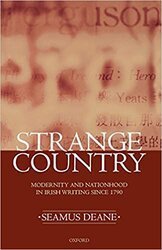Reflection: Eve Patten
Many years ago I was a lowly research assistant on the Field Day Anthology. This simply meant that I chased down a couple of references for some obscure footnotes in one of the sections, but Seamus still insisted that my name was included in the volume acknowledgements. It was typical of his generosity and his ability to treat everyone—even obscure doctoral students that he didn’t know at all—with respect and interest.

I did not know him well on a personal level, but perhaps I can say something about what he meant to the handful of research students working in Trinity on what used to be called ‘Anglo-Irish Literature’, back in the late 1980s and 1990s. Here was an intellectual who made Irish writing relevant to the world, and did so in the most elegant, economic prose, the most articulate, accessible lines of argument. The book that really inspired me was (and is) Strange Country (1997), which is based on his 1995 Clarendon Lectures. Suddenly, in the midst of the pedestrian academic material that we were trying to assimilate, there was Seamus Deane reading modern Irish literature through the poles of ‘Boredom and Apocalypse’; effortlessly interpreting Ireland alongside the Empire, Joyce alongside D.H. Lawrence, D’Arcy McGee alongside Derrida. This was pioneering criticism in Irish literary and cultural history, and regardless of all our divergent political perspectives, it laid the foundations for so much of what has followed since.
Eve Patten is Director of the Trinity Long Room Hub Arts and Humanities Research Institute, Trinity College, Dublin, and editor of Irish Literature in Transition, 1940-1980 (Cambridge University Press, 2020). In 2018, she visited the Keough-Naughton Institute for Irish Studies and delivered that year's Seamus Heaney Memorial Lecture.